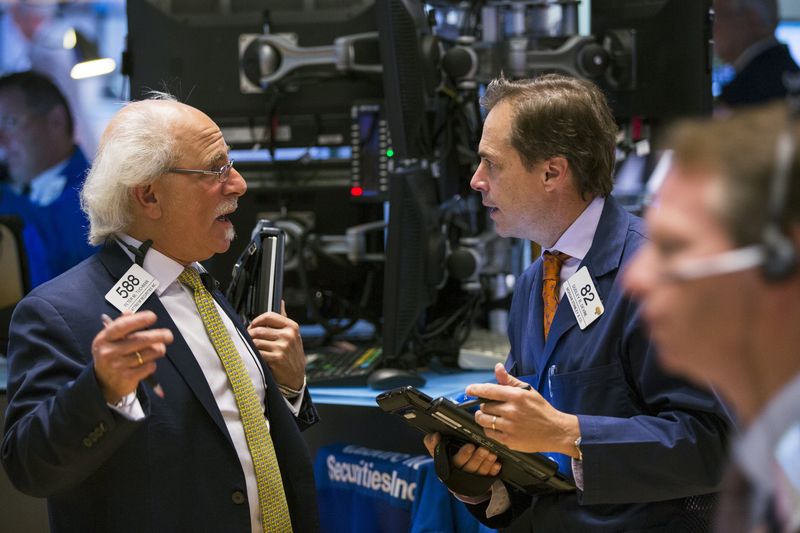Investing.com - Here are the top five things you need to know in financial markets on Monday, March 19:
1. Global Stocks Start The Week On The Back Foot
Global stock markets started the week on the back foot, as traders braced for the first rate hike of the year from the Federal Reserve later this week, and as persistent worries about a global trade war kept markets on edge.
Most Asian shares ended lower, but China managed to eke out some gains. Japan's benchmark index underperforming regional peers as the country’s political drama tested investor nerves.
The Nikkei lost 0.9% after weekend polls suggested a massive drop in public support for Prime Minister Shinzo Abe over his handling of a festering cronyism scandal.
In Europe, the pan-European Stoxx 600 index, the region's broadest measure of share prices, was down 0.8% in mid-morning trade, with all sectors and major bourses in negative territory.
Meanwhile, on Wall Street, U.S. stock futures pushed lower in risk-off trade, an indication that equities may be ready to extend last week's pullback.
Dow futures slumped 125 points, or 0.5%, from their Friday close, while S&P 500 futures lost 13 points, or 0.5%, and Nasdaq 100 futures dropped 85 points, or roughly 1.2%.
While Wall Street had bounced on Friday, the major indices still ended lower for the week. The Dow lost 1.5%, the S&P 1% and the Nasdaq 1.2%.
2. Dollar Catches Breath After 4-Week Win Streak
The U.S. dollar was little changed to start the week, pausing for breath after posting four consecutive weeks of gains, as markets awaited an upcoming Federal Reserve meeting where it is likely to hike interest rates and offer clues on the pace of monetary tightening for the remainder of this year.
The dollar index, which gauges the U.S. currency against a basket of six major rivals, held steady at 89.80 in early trade.
It hit a two-week high of 90.38 on Friday amid speculation the Fed will raise rates four times this year, more than the three it currently forecasts.
Meanwhile, the U.S. 10-year Treasury yield ticked up to 2.863%, remaining within sight of a four-year high of 2.957% reached last month.
Monday's calendar features no major economic data releases.
3. Bitcoin Bounces Back After Plunging On Report Of Twitter Ban
Bitcoin prices recovered to trade above $8,000, following a wild weekend that saw the digital currency plunge amid reports suggesting that Twitter could be the next company to ban crypto-related ads, following similar moves by Google (NASDAQ:GOOGL) and Facebook (NASDAQ:FB) earlier this year.
The world's biggest virtual currency by market cap hit a low of $7,240 late Sunday, before rallying back by almost $1,000 to $8,225, putting it up 6.9%, or $530, for the day.
Traders attributed the comeback to a report saying that the Financial Stability Board (FSB), which coordinates financial regulation for the Group of 20 Economies, resisted calls from some G20 members to regulate cryptocurrencies, like Bitcoin.
Other major cryptocurrencies were also higher, with Ethereum, the world’s second largest cryptocurrency by market cap, rising about 3% to $531.38.
The third largest cryptocurrency Ripple advanced roughly 6.5% to trade at $0.65052.
4. Oil Prices Fall Amid Rising U.S. Shale Output
Oil prices started the week in negative territory, as rising drilling activity in the United States pointed to further increases in output, raising concerns about a return of oversupply.
New York-traded WTI crude futures shed 25 cents, or 0.4%, to $62.16 per barrel, while Brent futures dipped 23 cents, or 0.4%, to $65.97 per barrel.
U.S. drillers added four oil rigs in the week to March 16, bringing the total count to 800, the weekly Baker Hughes drilling report said on Friday.
The U.S. rig count, an early indicator of future output, is much higher than a year ago when 631 rigs were active as energy companies have continued to boost spending since mid-2016 when crude prices began recovering from a two-year crash.
5. G20 Meeting Kicks Off Amid U.S.-China Trade War Fears
Finance ministers and central bank governors from the world’s twenty largest economies are set to meet in Buenos Aires for the next two days, with the state of the global economy and risks to growth at the top of the agenda.
The subject of multilateral trade is likely to be a major topic of discussion after recent changes to U.S. trade policy created a growing sense of uncertainty and sparked fears over a trade war.
Several G20 officials, including the finance ministers from host country Argentina and Germany, said they will insist on maintaining G20 communique language emphasizing "the crucial role of the rules-based international trading system."
